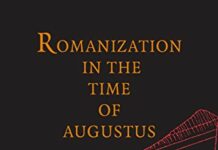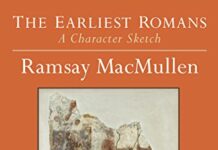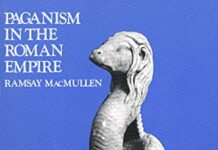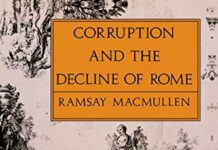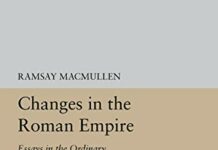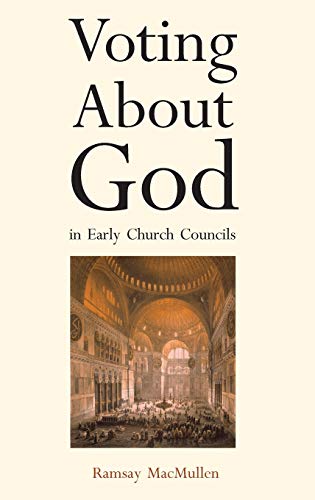
Ebook Info
- Published: 2006
- Number of pages: 192 pages
- Format: PDF
- File Size: 1.12 MB
- Authors: Ramsay MacMullen
Description
In this study, Ramsay MacMullen steps aside from the well-worn path that previous scholars have trod to explore exactly how early Christian doctrines became official. Drawing on extensive verbatim stenographic records, he analyzes the ecumenical councils from A.D. 325 to 553, in which participants gave authority to doctrinal choices by majority vote.The author investigates the sometimes astonishing bloodshed and violence that marked the background to church council proceedings, and from there goes on to describe the planning and staging of councils, the emperors’ role, the routines of debate, the participants’ understanding of the issues, and their views on God’s intervention in their activities. He concludes with a look at the significance of the councils and their doctrinal decisions within the history of Christendom.
User’s Reviews
Editorial Reviews: Review “Ramsay MacMullen has written another provocative and highly original book. He shows how Christian doctrine came to be decided by the democratic votes of bishops, and how the passions that this aroused all too often led to actual violence.”—Averil Cameron, Keble College, Oxford University — Averil Cameron”In MacMullen’s highly original book we get a sense of what it was like to be at an early church council, how arguments ebbed and flowed, how power was wielded, how participants were intimidated and inspired.”―David Brakke, Indiana University — David Brakke”By fine literary detective work, MacMullen reassembles the mobs of bishops who debated, voted, and rioted in the fifteen thousand or so early church councils, tracing the progress of Christianity from a raucous democracy to a harnessed hierarchy.”―Garry Wills, Northwestern University — Garry Wills”Bloodthirsty bishops raining curses on their enemies storm through these pages, then step aside, humbled, allowing MacMullen’s cool, sane, and immensely learned analysis to enrich our understanding of the making and fragmenting of Roman imperial Christianity.”―James J. O’Donnell, author of Augustine: A New Biography — James J. O’Donnell”A wonderfully fresh look at the early Christian councils . . . both scholar and lay reader will find this volume a treasure trove to be savored and enjoyed.”–Gaye Strathearn, BYU Studies — Gaye Strathearn ― BYU Studies About the Author Ramsay MacMullen is emeritus professor in the Department of History at Yale University. Among his many previous books are Christianizing the Roman Empire, Corruption and the Decline of Rome, and Christianity and Paganism in the Fourth to Eighth Centuries.
Reviews from Amazon users which were colected at the time this book was published on the website:
⭐I first read Ramsey MacMullen’s “Christianizing the Roman Empire” some twenty years ago. This is written very much in the same style and the same approach: fresh and insightful. Yes, there is blood and gore breaking out at church councils, but there is much more to this book than sensationalism. The human element is portrayed, but so too are the very difficult metaphysical questions with which the council fathers wrestled as well as the human element involved in the conciliar process. After all, Ramsey MacMullen is a sociologist of religion and not a theologian or a church historian. He is interested in the human element in all of this.Ramsey MacMullen is trying to get inside the head of an “ordinary bishop” to see how he was shaped and formed and how he would react during the actual council. The “ordinary bishop” would be at least fifty years of age and well read in the Bible. He may or may not be learned and will probably not have the political connections of the bishops of the largest and most influential cities that had close ties to the emperor. The “ordinary bishop” is a deeply religious man and superstitious by modern standads. Such a man is deeply passionate about his religion and is willing to suffer for it. He is so passionate about his religion and his particular version of orthodoxy that he is also willing to inflict suffering on those who oppose the “true” faith. Thus, one sees bishops at their most ceremonious and most reverent during the councils that decided who Jesus was in relation to the other persons of the trinity and other such theological complexities. One also sees them at their most passionate with tears and outbursts and waving of their hands and supplicating the president of the council on their hands and knees. One also sees the bishops striking others, restraining others, muzzling or shoving each other and denouncing the opposing party as heretics worthy of death in the most cruel manner possible. And when the council spills out into the streets they behold the mob violence that ensues. Sometimes they encourage their own party to act, other times they passively observe the violent outbursts of the mob while saying nothing.MacMullen comes to the conclusion that it was a tragedy that the higher echelon of better educated and most intelligent bishops triumphed during the councils, for it alienated the “ordinary bishops.” Thus, such ecumenical councils as Chalcedon and Constantinople II were failures because they failed to involve the ordinary bishop due to their abstruse theologiizing. Christianity was thus splintered into the Roman, Arian, Nestorian, Monophysite, Eastern Orthodox and Coptic varieties.I suppose I am surprised by the glee with which previous reviewers describe the ugly side of the church fathers and church councils, but this is nothing new to anyone who is familiar with church history and the fathers. None other than Gregory Nazianus, who has been granted the honorific title of the “theologian,” was disgusted by the conciliar process over which he presided at the second ecumenical council of Constantinople in 381.
⭐This is an excellent book that covers much of the ancillary societal environment surrounding the means by which members of the church hierarchy decided doctrinal issues at the time the Nicene Creed(s) were formulated (and fought over) . I would have given the book 5-stars, but the authors writing style is awkward and tedious to read. His use of unusual words and phraseology adds to the awkwardness. Sometimes so much detail is provided with respect to places and actors that it becomes confusing to remember who is who and what happened where and when. But still well worth reading.
⭐The manner in which Christianity has been governed from the beginning has had its partisans. Lately Catholicism has been driven by an ever-contracting committee in an ever-isolated citadel, much like Orwell’s “Ministry of Truth” in “1984”. This study, “Voting About God”, demonstrates that it was something very different in the first quarter or more of Christianity’s existence; a species of Democracy, in fact. Not just the occasional “ecumenical” council but frequently and widely and matter-of-fact in its manner of conduct and way of establishing decisions. A Papal dictator was unheard of till our own era. Good to know.
⭐I’ve had a long time interest in religion. I also enjoy history. This is a nice piece of scholarship which I found enjoyable to read. The author’s writing is smooth and conversational.
⭐This work speak of how the Church Councils formed themselves around secular models and gives some good insights to how and why this would happen. However, I think he carries the analogy to far without giving credit to church leaders seeking to remain orthodox and follow Jesus’ teaching.
⭐Voting about God was a fun and enjoyable read. I found it clear and accurate in detail and in content. A great way to learn how the Early Christian Church approached divine revelation and dogma.
⭐I was looking for a historical book about the early church councils, and thought that this book would be a good start. I wanted an unbiased opinion, but unfortunately there was nothing but bias. It was clear from the start that the author had strong feelings against the councils, which can be understandable, but I was still hoping to get some facts out of it. Chapter after chapter, the author bashes every aspect of the church, leading me to believe that the church did no good, or that the author simply chose to ignore the good in his text. Imagine if the United States’ history only mentioned taking land from the Native Americans, enslaving Africans, the Civil War, the Great Depression, and using the first nuclear weapon. That’s how this book reads. Finally, it’s written like prose from Shakespeare. I had a hard time following his train of thought because the writing was so dense, almost as if he was writing from the mind of a bishop in 500 AD.
Keywords
Free Download Voting About God in Early Church Councils in PDF format
Voting About God in Early Church Councils PDF Free Download
Download Voting About God in Early Church Councils 2006 PDF Free
Voting About God in Early Church Councils 2006 PDF Free Download
Download Voting About God in Early Church Councils PDF
Free Download Ebook Voting About God in Early Church Councils
